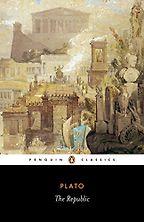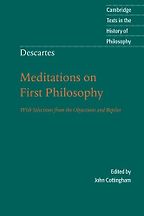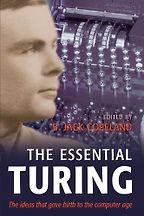Can you begin by saying something about the philosophy of information? When I studied philosophy there weren’t any courses on the philosophy of information so I’m not exactly sure what it is.
The philosophy of information is a new area of research. We didn’t study it when we were students, partly because we didn’t realise that the glasses were on our noses. There’s a lot of philosophy from the ancient Greeks to the present day that discusses what we now think of as the philosophy of information, it’s just that it wasn’t called that, and the focus of our society, our cultural interest, wasn’t on this particular concept. But in ethics, for instance, when you discuss what it takes to make the right decision, it takes a well-grounded rational, well-informed agent. In Epistemology the foundation of knowledge requires some initial of information that you need to justify, warrant, and support. And so on. The philosophical discourse has always included an interest in what we would today call information.
When I was a graduate student, I was looking for a way of discussing some of the contemporary issues of information technology from a philosophical perspective that would be well informed by past relevant theorizing. I came across a paper by Karl Popper entitled “Epistemology without the knowing subject,” and all of a sudden I realised that if you take the knowing subject away from epistemology all you’re left with is information. If you take away Mary from ‘Mary knows that p’ all that’s left is ‘that p’, and ‘that p’ is just that piece of information. Similarly ‘Paris is the capital of France’ or ‘a piece of toast’ or ‘water is H2O’ are just information. What I found wasn’t entirely unprecedented, but it was a new perspective on classic issues that could engage with the problems of our time, namely the philosophy of information.
So it sounds as if you are saying that there’s been an ‘informational turn’ in philosophy, almost like the linguistic turn in the 20th century, and that it’s triggered a new understanding of philosophy’s past, this time inspired by digital technology.
That’s a very nice way of putting it. In the same sense that we’ve been doing philosophy about language forever – it’s not like there’s no philosophy of language in Plato, in Aristotle, and in Thomas Aquinas, it’s just that it wasn’t called ‘philosophy of language’, and meaning wasn’t the central issue – likewise, the philosophy of information has been there since day one, it’s just that it wasn’t described in those terms, it wasn’t the main focus. I inherited from my postdoctoral mentor Michael Dummett a very nice, perhaps oversimplified picture of the history of philosophy, which is this: ancient philosophy was more concerned with the nature of things and therefore hugely concentrated on ontology and metaphysics. That continued all the way through the Middle Ages. Then came modernity as the age of the centrality of epistemology, the philosophy of knowledge. Then contemporary philosophy, from Wittgenstein onwards, has had as its central idea the philosophy of language: questions about meaning, semantics. In short, philosophy about reality, philosophy about our knowledge of reality, and then philosophy of the language of our knowledge of reality. To this oversimplified caricature we could add another stage: the information turning point. Not what reality is, not what we know about the nature of reality and what it is, not focused on just the means through which we make sense of our world through reality, but rather the technological and informational framework within which we make sense of our knowledge of reality.
“If you take the knowing subject away from epistemology all you’re left with is information.”
People who don’t know much about the history of philosophy complain that we never solve problems. I would like to invite them to eat a steak made from a woolly mammoth and then tell me there has been no progress in cuisine. Of course there has been progress, it’s just that it isn’t the same kind of progress that you find in science. Likewise in philosophy, we do things differently, and I would say we now do things better. It’s just that the previous chapters have not been erased. We just accumulate new chapters. So the fourth chapter in this particular history is the philosophy of information understood as something more central, from our perspective, and for our time. And mind that the same people who complain about philosophy tend to forget that we shall be studying good contemporary philosophy in a thousand years when good contemporary science will have been superseded.
Of course your caricature of the history of philosophy misses the crucial part which is that, at least from Socrates onwards, the question of how we should live has been central. It’s interesting how you personally have been drawn in from your work on the philosophy of information to moral and political debates about privacy in the age of the Internet as an advisor to Google on the so-called ‘right to be forgotten’.
You’re completely right. I fear that ethics, or the moral discourse, has always been seen as subsidiary to whatever the mainstream orthodox way of doing philosophy was. For Aristotle it was subsidiary to a metaphysics of anthropology, the question of what a human being is. You get a virtue ethics perspective following from what it is to be a complete, well-functioning, human being. Then in the medieval period religious metaphysics determined the ethics. Then through to modernity where you have to have a complete account of reality and then do the ethics – Kant is a classic example of this. And so on. I think we see a similar phenomenon today. You do a philosophy of information and try to extract from that lessons that can inform your ethical discourse. But I would disagree with the idea that ethics comes second in importance. Not at all. Perhaps a better way of putting this is that you need to do some preparatory work, some ground breaking, in order to build the right kind of ethical understanding of your time. Depending on the stage we are in our development, sometimes that ground-breaking work has to be metaphysical, sometimes it has to be epistemological, or semantic, or logical, and I would say today it has to be in terms of information. Every philosophy has to look at the nature of ultimate things, it has to be eschatological in that sense, so ethics and, indeed, the political discourse, are the end of the intellectual journey.
Part of this connection between the philosophy and the ethics of information has very strong practical everyday consequences. In my case this has led to my role on Google’s Advisory Council. As the only philosopher there I wear the ethics hat and I’m supposed to be the one who provides input, feedback, suggestions, and recommendations on the ethics of the ‘right to be forgotten’ issue.
People may want to know why this issue is so important. It seems to have exploded beyond all proportion, taking more space than it really should. There is a reason for this. The best analogy here is a spark somewhere where dynamite has been stored. When people say ‘What’s the big deal, it’s only a spark?’ they focus on the spark, and miss the dynamite. So many issues could explode as a result of this. It’s not just a matter of whether or not some links should or shouldn’t be removed from a search engine. First of all, it’s a clash between two fundamental ethical principles, which, so far, thanks to lack of technology and a different culture, had never encountered each other head to head. One is privacy, which wasn’t even in the index of practical ethics textbooks in the 1980s, but we had treated as a fundamental principle of a liberal democratic society for a very long time. The other principle is free speech. This little spark has made these two giants fight each other.
On top of that there is the political side. One of these principles – privacy – is robustly defended in Europe and by the European Union in the European Court of Justice. The other, freedom of expression, is in the cultural DNA of America and the corporate world. So you also have an American versus EU fight. On top of that you have politics versus the corporate world, because politics and Europe defend one side, America and the corporate world the other. Just to add a further issue: we also have problems about the nature of the law because all this happens in a space which isn’t physical. From the 17th century onwards law has been grounded by territoriality: my country my law, your country yours. We might find a point of agreement, in which case it covers both. Borders determined the limit of the law. Once you move into cyberspace or the infosphere, all of a sudden there are no borders. So should a decision taken by a European court of justice be applied all over the world? Should an organisation like Google be forced to remove links in all its search engines including Google.com or not? Again, this seems to be a small issue, but it’s not. Should Europe legislate for the whole world? It is easy to list other issues, such as the role of mass media in a digital world, and so forth. This is why this particular spark has ignited a huge, international debate.
The philosophy of information underlies all these issues. It’s only through understanding what information is and what it means that we can start to grapple with the problem of privacy or any other issue that arises out of new technology. You’ve chosen as your first book Plato’s Republic – a great work of philosophy, but what’s the connection with information?
As I said near the beginning of this interview, I strongly believe we have been doing the philosophy of information without knowing it. Plato is a great philosopher of information without the word being there. When it comes to the classic image of the myth of the cave, you can reinterpret the whole thing today in terms of the channel of communication and information theory: who gets access to which information. The people chained in front of the wall are effectively watching television, or glued to some social media. You can read it that way without doing any violence to the text. That shows two things. First, why it is a classic. A classic can be read and re-read, and re-interepreted. It never gets old, it just gets richer in consequences. It’s like old wine, it gets better with time. You can also see what I mean when I say we’ve been doing the philosophy of information since day one, because really the whole discussion of the cave is just a specific chapter in the philosophy of information. The point I try to glean from that particular feature in the great architecture of the Republic is the following: some people have their attention captured constantly by social media – it could be by cats on Facebook. They are chained to that particular social media – television yesterday, digital technology today. Some of these people can actually unchain themselves and acquire a better sense of what reality is, what the world really is about. What is the responsibility of those who have, as it were, unchained themselves from the constant flow, the constant grab of attention of everyday media, and are able to step back, literally step out of the cave? Are they supposed to go back and violently force the people inside to get away, as the text says? Updated that would mean, for example, implementing legislation. We would have to ban social media, we could forbid people from having mobile phones, we’d put some kind of back doors into social media because we want control. Or do we have to exercise toleration? If so, it would be a matter of education. We’d have to go back and talk to them. In essence here Plato, by addressing these questions, is giving us a lesson in the philosophy of information.
Your second choice is another classic, René Descartes’s Meditations. Descartes chose to write that book in the vernacular, in French rather than in Latin which was the common language of intellectuals of his day in 17th century France. Presumably this was because he wanted to reach a wide audience and had something important to say?
From Plato, to Descartes, to Russell — the last philosopher I know of who was good at this — philosophy has always had this valuable attitude of speaking to both sides of human interest: to the intellectual, the academic, the ivory tower; but also to the practical, ordinary aspects of the world. From Descartes, through Hume, even to Kant (not the most accessible philosopher, but at least he made an attempt), all the way down to Russell, we have this double channel of communication. It is not popularising philosophy, it is not making philosophy cheap, it is not philosophy for dummies, it is philosophy made interesting to interested people. There are different vocabularies, different ways of speaking. And that’s why Descartes wrote the Meditations in a language that was available to a well-educated person who didn’t have that much Latin. Meditations is not only a classic — it’s easy to find almost anything you want in it — but I also see it as one of the books that you could recruit into a history of the philosophy of information.
Get the weekly Five Books newsletter
The debate about scepticism is often misunderstood. It is not an intellectual game, it is not by someone who has time and money to waste wondering whether he exists. Anyone who tries to refute scepticism is wasting their time and no decent philosopher has taken that sort of speculation very seriously. Scepticism in the Meditations is to be understood technologically. It works in the same way that you benchmark a particular product by testing it in extreme conditions, so that, when you put the product on the market, it is robust. You test a car in extreme conditions. Nobody would dream of driving that car in those conditions. Descartes is acting like an engineer testing ideas. Descartes wants to doublecheck that the science we’re building is going to be so robust that even when you run the most insane test it will still work. It’s silly to conclude from this that the task of philosophy is to refute the sceptic! That’s not the point. Scepticism in Descartes is a matter of increasing the pressure and showing how much his ideas can actually withstand. It is about resilience.
So Descartes is testing the means of acquiring knowledge to destruction. I like that image.
There are many ways of reading the Meditations. Today Descartes speaks more directly to us if you understand him as the equivalent of an engineer testing a product. Much better to read it that way than suggesting that we are living in The Matrix.
What about Immanuel Kant? Your third choice, his Critique of Pure Reason, unlike Descartes’s Meditations, has never reached a wide popular audience.
We all know that he couldn’t write, no matter how much he tried. Even German people prefer to read him in English translations because the translations clarify what he might be saying. I find reading Kant a bit like understanding cricket as a foreigner: hard to get at first, but once you get it, it’s very enjoyable. Once you start to understand the rhythm of that way of thinking, it’s mind-boggling. It’s quite extraordinary. You can feel the power of that way of conceptualising problems. What I have learnt from Kant is an important lesson: when you discuss any philosophical problem there is one fundamental clarification that has to precede any discussion. This is, ‘Does that question make sense to us given the conditions of possibility of the debate?’ When we overstep the limits of what we can process, the information that it is sensible to ask about, then we know that we are stepping into pure metaphysics. For us, today, it is pure speculation when there is no way of being wrong. There’s a lot of philosophy of that sort — especially the philosophy of technology, and some popular philosophy — that’s just pure discourse. Or there is speculation in the manner of a Sudoku game or a chess problem. I have no time for speculating about some possible metaphysical world, while the current one is burning. Kant is a good antidote both to pointless speculation, the anything goes approach, and the purely logical one in which you make some hypothetical assumptions and see what you can deduce. That’s interesting, but it’s no longer philosophy. It’s not talking to its time and to relevant problems that are of genuine concern. It’s intellectual fun, but ultimately pointless. Kant helps us focus on real philosophical problems. Philosophy has a major role to play today. What is happening is that some problems can, in principle, be solved by maths, experiments, and facts, and therefore we don’t call them philosophy any more. Meanwhile, there are more and more philosophical problems arising from new technology and new ways of living. Philosophy deals with the problems that lie between the world of facts and the world of logical possibilities.
My simple view of Kant in the First Critique is that he explains how what we are constrains what we could possibly know. So presumably, if you’re a Kantian, there must be logical limits to the kind of information that you could actually acquire.
That’s fundamental. Kant has a lesson that we still have to learn which is that any form of naïve realism — based on the way the world seems to me, or the way science tells me the world is — should not be taken seriously. What Kant tells us is that we process input (the message) from the world (the source of the message) – what we’d now call data. Information is constrained by the data: if you jump out of the third floor window, you’ll break your neck. You don’t build the world from your imagination. Nevertheless, the world isn’t just as it seems to us. The analogy here is, once again, with cooking. The data are the ingredients of our dish. We process them to obtain a specific outcome, which is our information. The relation between the dish and the ingredients is not one of representation, but one of constraining affordances: given those ingredients/data there are only a few ways of cooking/knowing that make sense and transform them into the right dish/information. To put it differently, I find it very naïve when people talk about knowledge as if it were “of” reality: reality is the source of the signals, but our knowledge is of the signals. It’s a bit like saying you hear music on the radio. The music is sent by the radio, but it is not about and does not “represent” the radio. Versions of structural realism in philosophy of science support this view.
With your fourth choice, we are certainly in the realm of information because we’re dealing with Alan Turing, who made a major contribution to the evolution of the computer. This is a selection of papers that you’ve chosen. Is there something you want to single out there as quintessential Turing?
The quintessential Turing for philosophy is certainly the Turing test as described in The Imitation Game. The Turing test has in it a Kantian lesson. Sadly, if you look at the Loebner prize, they have a medal that has ‘Can a Machine Think?’ on it. Unfortunately they missed Turing’s answer to that question, which is that it is “too meaningless to deserve discussion.” He didn’t ask that question in the paper. What he did say is that because this question doesn’t provide the conditions of possibility for an answer – because we don’t know what ‘think’ is, and we don’t even know what a ‘machine’ is – we can’t answer it. But we can run a test and if you can’t see a difference between the answers of a human and a machine, then the machine has passed the test. So what Turing tells us is that you need to be clear about the level of abstraction at which your discussion is taking place. Unfortunately ‘level of abstraction’ has a technical sense in computer science which is often misunderstood in philosophy because there are no levels – levels of abstraction don’t come in a hierarchy. If you look at a house, you can look at it from the perspective of the owners, the council, economic, a lawyer’s perspective – these are all different levels of abstraction. In the Turing test, the level of abstraction is provided by the questioning game and the comparison of the two players at the level of their abilities to understand questions and answer them meaningfully.
Turing sounds quite close to pragmatism in that he’s suggesting, with the Turing test, that if a person and a computer produce the same sort of effect then that’s sufficient for treating them in a similar way.
There’s something of Charles Sanders Peirce in this, you’re right. He’s another of my heroes, another figure in the history of the philosophy of information, and if I’d had six book choices I’d have included him. Sometimes you really have to stop looking for the essence of the ingredients but look at the effects that the ingredients have.
You’ve made an unexpected choice for your fifth choice: Lyotard’s book The Postmodern Condition.
I wanted to include a more contemporary book. The reason Lyotard’s book is on my list is that I read it when I was too young, and I misunderstood it badly and didn’t think much of it. I re-read it when I was more mature and now realise that there were fundamental lessons and extraordinary insights there that I had missed completely when I was an undergraduate. Selecting only one, perhaps the most fundamental, lesson that I learnt from Lyotard relates to the socio-political aspects of technology. There’s an emphasis in Lyotard’s book on the connection between politics and technology, the politics which manipulate and affect technologies and so impact how we live. The politics of information is a notion that we need to explore much more deeply than we have done so far.
Is there an example of that, of a specific technology affected in this way?
We used to think that power was about either the creation or the control of things, that it was about the means of production of goods. That’s what Marx thought. It was not about the production of experiences or services. Then society switched to a focus on power being expressed through the control of information. Once control of information is recognised as a source of power, then any powerful entity wants to control this information. Governments and empires all want to control information. What we’re seeing today is the very beginning of another switch, from power over things, to power over information, to power about the questions that shape the answers that give the information about things. If you take the view that semantic information is broadly speaking delivered as a question plus an answer, then those who control the questions shape the answers. That’s the new power we need to understand and manage properly today.
Five Books aims to keep its book recommendations and interviews up to date. If you are the interviewee and would like to update your choice of books (or even just what you say about them) please email us at [email protected]
Five Books interviews are expensive to produce. If you've enjoyed this interview, please support us by donating a small amount.










